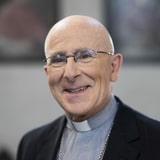Historians have researched the archives of the Roman Catholic Church across Switzerland, with a particular focus on sexual assault. The investigation uncovered 1,002 cases of abuse from 1950 to the present. Bishop Joseph Bonnemain on the church’s measures.
SRF News: It has been known for decades that sexual assaults occur in the Catholic Church. In other countries people looked much earlier, why only now in Switzerland?
Joseph Bonnemain: Firstly, because Switzerland is complex. There are many cantons and different cultures that live together in this country. We have the state church organizations, i.e. the regional churches, the dioceses and also the religious communities. And right from the start we wanted these three institutions to work together in such a study. It took time and the art of persuasion until we convinced everyone to make this happen.
We absolutely need a radical cultural change.
At the same time, we absolutely need a radical cultural change. So that the focus is no longer on the institutions, the church and the good reputation and even less on the perpetrators, but on the victims and the people. We needed time to make this cultural change ourselves.
A preliminary study documented 1,002 cases of abuse in the Catholic Church in Switzerland. And historians say that this is just the tip of the iceberg, there is much more to come.
The researchers have encouraged other victims to come forward, as well as people who have knowledge of such attacks. That’s why a lot of people will definitely come forward.
Such attacks leave wounds that last a lifetime.
But that’s good. We have to be there for people, especially for the weakest, for the most needy, for the neglected, for all these people who carry wounds with them. Because such attacks leave wounds that last a lifetime.
For decades the church has protected perpetrators instead of victims and systematically covered up cases. What specifically are you doing now for the victims?
We have decided on concrete measures. Firstly, a Switzerland-wide independent reporting center will be professionally set up so that victims can easily report and receive care, support and support.
The admission requirements for those who would later like to work in pastoral care are very strict.
Secondly, the admission requirements for those who later want to work in pastoral care are very strict. We will set standards for psychological testing for the whole of Switzerland. We will professionalize the personnel dossiers so that everything that is recorded by those working in the church is recorded and nothing is lost. When people move jobs between dioceses, their dossiers should be able to be passed on. We will also prevent and prohibit files from the archives from being destroyed. This has already been implemented.
So the main thing is prevention. However, several incumbent bishops are currently being criticized. As a bishop, you are now commissioned to examine these cases. Shouldn’t an external person do this?
It would be ideal if an independent person did this. However, this is currently not possible because the 2019 law stipulates that this is done by a bishop in the country. For this reason alone I was very reluctant to accept the order. But I accepted it with the determination not to let anyone influence me. I will thoroughly study all the facts, files, conduct interviews and surveys and, at the end, record the whole thing in a report and send it to Rome.
Bigna Silberschmidt conducted the interview
